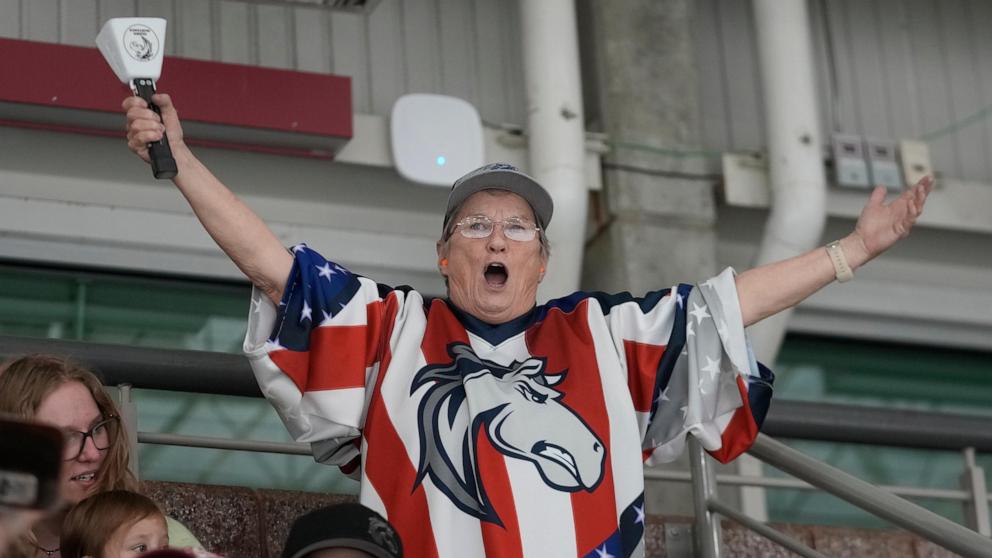SALT LAKE CITY — To casual sports fans and people outside of Northern Utah, it may seem like an NHL team has fallen into Salt Lake City's lap in two weeks.
But local organizers say the Arizona Coyotes' move to Utah is the culmination of a multi-year effort to attract professional hockey and other elite sports to the burgeoning capital.
The move announced Thursday marks a moment of maturity for Salt Lake City as the professional sports capital of the Mountain West, the second major professional sports franchise in 45 years since welcoming the NBA's Utah Jazz to the mid-market. becomes.
Observers say it remains to be seen whether the city can bring the same enthusiasm to hockey as it has to basketball and provide the necessary stability to a team that has bounced around over the past few years. .
Plans have already been floated in Utah to build a hockey-only stadium, which could serve as the main venue for the 2034 Winter Olympics, with the International Olympic Committee expected to make a formal decision this summer. In the meantime, the team will share Delta Center with the Jazz.
Salt Lake City is also actively pursuing an MLB expansion team, which would make it home to three of the “big four” leagues in the United States, and advanced plans call for the construction of a new baseball stadium. is also underway. And Utah billionaire Ryan Smith, who owns the Jazz, the Real Salt Lake professional men's and women's soccer teams, the Utah Royals, and a new hockey team, has turned part of downtown into a sports and athletic field. We have applied to work with the city to change this. Red light district.
Together, these efforts provide an opportunity to expand Salt Lake City's footprint in the sports world and prove that this famous winter sports destination can sustain multiple professional teams year-round.
Salt Lake City Mayor Erin Mendenhall said the Coyotes' relocation is a “defining moment” in the city's trajectory that will unlock new growth potential. State and local leaders have been outspoken about leveraging the local love of sports to move the city forward. This strategy has proven successful in other mid-sized cities, such as Las Vegas, which is home to the NFL and his NHL team, and where an MLB team is also planned.
When given the opportunity to host major sporting events, from the 2002 Winter Olympics to last year's NBA All-Star Game, Salt Lake City has underperformed, said Utah State Athletic Commission Chairman and CEO ( CEO Jeff Robbins said. He said the NHL move may seem sudden, but it was made possible by the confidence Utah has instilled in industry leaders for decades.
“It didn't just fall into our laps,” Robbins said. “What you're seeing is great momentum towards something we've been working on for a long time.”
While several other cities in the U.S. and Canada are vying for an NHL team, Salt Lake City will soon be joining the Coyotes after years of turmoil, according to David Carter, a sports business professor at the University of Southern California. It is said that he provided a “soft landing place” for the
The Coyotes have bounced between stadiums, most recently playing in a 5,000-seat arena. Plans for a new hockey stadium may have helped attract them to Utah, but if it didn't pan out or Smith's company couldn't generate enough media revenue, ticket sales or sponsorships. , Carter warned that they could be left homeless again. Ensure team longevity.
NHL Commissioner Gary Bettman said he wants to place the coyote in a place where he can “succeed right away” with a trusted owner.
“We focused on the fact that these are the types of owners we want and this is the type of community we want to be a part of,” Bettman said Friday.
Hockey fans outside the Beehive State also question whether the modest metropolis of just over 200,000 people can sustain a professional team.
Including the suburbs, the entire Salt Lake Valley has a population of approximately 1.26 million people and a light rail system that puts suburban residents within steps of the downtown stadium. Jazz fans have been flocking to the Delta Center for decades, even in losing years, and only time will tell if the basketball craze will lead to a similar hockey craze.
Early data seems promising for Smith, with the team saying Friday that it has already received 22,700 season ticket deposits. This is more than four times the Coyotes' current stadium seating and nearly double the Delta Center's current hockey capacity.
Robbins said the sport has started to pick up locally since Salt Lake City began hosting the NHL's preseason exhibition game, the Frozen Fury, in 2021. The Valley is currently home to 17 rinks, a youth hockey program, and a minor league team that set a new record for average attendance this season.
For former NHL player Ken Sabourin, who spent part of his career playing in the minors in Salt Lake City, it was “a great place to play,” with big crowds. He believes the local infrastructure is in place, but worries the Coyotes, who are ranked second from last in the division, aren't a strong enough team to attract new communities.
“The hockey market is good. It's a good sports market,” said the player-turned-analyst. “I think they have their fans. It's just a matter of whether they come out or not.”
___
Associated Press hockey writer Stephen Wyno contributed to this report.


